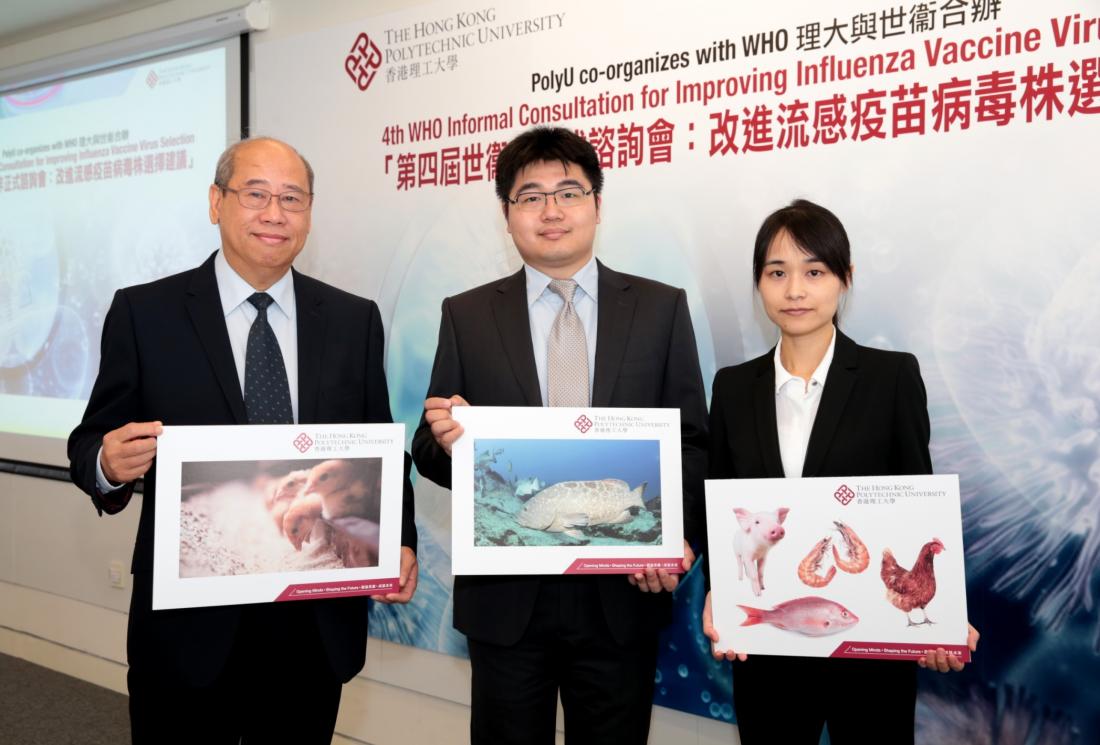PolyU and WHO are co-organizing “The 4th WHO Informal Consultation for Improving Influenza Vaccine Virus Selection” which will be held in Hong Kong from 18th to 20th of November, 2015.
With the mission to enhance food safety and reduce risks through innovative ways, the Food Safety and Technology Research Centre (FSTRC) at the Department of Applied Biology and Chemical Technology (ABCT) of The Hong Kong Polytechnic University (PolyU) initiated research programmes to address “food safety at source”. These include research on vaccines for the control of infections in farmed animals with the aim to reduce human infections by animal viruses.
In this connection, ABCT and the Global Influenza Programme (GIP) of the World Health Organization (WHO) are co-organizing a meeting entitled “The 4th WHO Informal Consultation for Improving Influenza Vaccine Virus Selection” to be held in Hong Kong from 18th to 20th of November, 2015. The first three meetings were previously held in Geneva.
The main objective of the meeting is anticipate more accurately the flu virus strains which will be circulating so that flu vaccines produced can better target the prevalent virus strain at the time of vaccination. The informal consultation will bring together approximately 120 local and international influenza experts to discuss methods to enhance global surveillance of circulating and emerging influenza viruses. The experts will also explore new technologies to study such viruses to inform the vaccine virus selection process. Recommendations for vaccine viruses for influenza vaccine production are made in February and September each year after careful comparison of recent circulating viruses globally.
Following the WHO meeting, ABCT also collaborates with the Global Initiative on Sharing All Influenza Data (GISAID) and the International Society for Influenza and Other Respiratory Virus Diseases (ISIRV) with support from WHO to organise a training workshop on “Genetic Analyses of Influenza Viruses” at the PolyU campus on 21to 22 of November, 2015. The training workshop will enable laboratories to contribute to and benefit from the extensive genetic and related data on influenza viruses, in relation to understanding the epidemiology, the evolution of the viruses, the emergence as well as spread of novel genetic and antigenic variants of influenza. Participants will be instructed on advanced analytical tools for the identification and interpretation of mutations underlying the evolution and antigenic variation of human and animal influenza viruses. Participating institutions will also share insights into human and animal influenza surveillance and research.
Co-organizing the current meeting with WHO and the associated workshop with GISAID allow PolyU researchers to share practices and insights of our animal influenza vaccine programme with key leaders in the field, and provide inspirations for the development of new method of vaccine administration and delivery.
Outbreaks of infections in food animal not only create substantial economic loss, but also create stress on our food supply as well as the possibilities of spreading such infections to human. Animal vaccine is the best approach to prevent such diseases on economic, environmental and ethical grounds, reducing the use of antibiotics in the farming of land animals and aquaculture industries. Europe, the United States and other developed countries have been the main force of animal vaccine markets in the world, while the fast-growing market of China and other emerging countries revealed an increasing demand on animal vaccines targeting local farming animals and aquaculture. Making use of this exchange opportunity, FSTRC will combine its research strengths in nutrition and food microbiology, award-winning technology in nanomaterial development and encapsulation with animal vaccine research. This will result in more innovative ways to improve administration of vaccines, such as submersion and oral vaccination, as well as improved efficacy and effectiveness through better vaccine delivery.
*****
Press contacts
Dr Kevin Wing-hin KWOK
Research Assistant Professor, Department of Applied Biology and Chemical Technology
Telephone : (852) 3400 8687
E-mail : [email protected]
Dr Amber Jiachi CHIOU
Research Assistant Professor, Department of Applied Biology and Chemical Technology
Telephone : (852) 3400 8664
E-mail : [email protected]
Prof. John Siu-lun TAM
Visiting Professor, Department of Applied Biology and Chemical Technology
Telephone : (852) 3400 8726
E-mail : [email protected]



